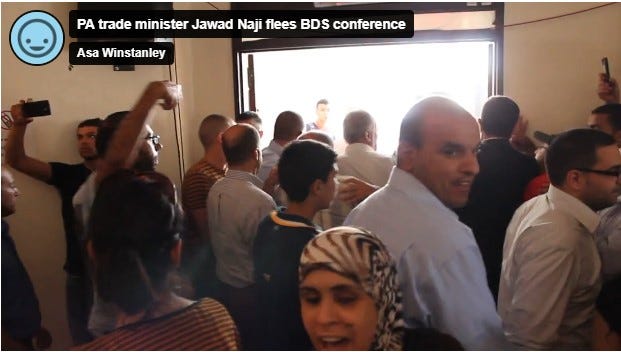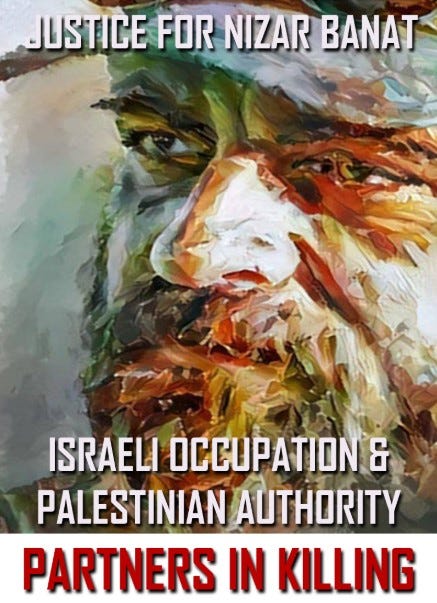The Prophets of Palestine
Nizar Banat's Fight for the Soul and Total Palestinian Self Determination
Editors Note: This article was a collaborative effort between Brummy Taz, of the Brummy Art Collective & Guy Schell. To support her work, follow the link.
An artist, poet, author, and friend, Brummy Taz asked that her short history of Nizar Khalil Muhammad Banat be available to everyone. In the West we seldom hear the stories of the many Palestinian Prophets, like Banat, who gave their lives to protect their families, their communities, and their properties from being violently colonized at the hands of zionist butchers. Banat was in the habit of publicly calling out the Palestinian Authority’s (PA) sycophantial collaborative relationship with their Western Colonizers and the Israeli Government. These words were getting plenty of air play among Nizar Banat’s 100K+ followers on social media.
The PA’s primary responsibility was to protect the security of the Israeli occupiers. The Palestinians had no interest in normalizing relations with those who continued to illegally confiscate their lands and disappear their family members. The West’s 21 century style colonialism could not be so easily rammed down their throats.
These sentiments became clear on Saturday June 8th, 2013 during a Boycott, Divestment, and Sanctions Conference held at Bethlehem University. At this event, denouncements and condemnations from the crowd of attendees, who were victimized by the Palestinian Authorities abusive policies, were showered on the PA’s attending Minister of National Economy, Jawad Naji. The Electronic Intifada reporter Asa Winstanley detailed the mounting tension in the room,
During a session intended to allow activists to hold the PA and the PLO to account, questioner Nizar Banat challenged Naji, and pointed out the elephant in the room when it comes to local BDS. He exclaimed: Abbas [Mahmoud Abbas, the president of the PA] says openly that he collaborates with the Israelis.
At this point Naji, who had been growing visibly uncomfortable at the mounting criticism, snapped. He accused the questioner of “barking” and shouted that he did not accept that someone could say “bad things” about “the president.”
The audience, who had loudly applauded Banat’s stinging denunciation of Abbas, then turned on Naji. The people demanded Naji apologize but he refused and instead walked out. The minister fled the hall with his entourage to angry chants of “get the minister out” and “collaborators!”
Later, reports began to emerge that Nizar Banat was targeted and viciously beaten by Naji’s agents in retaliation for his remarks at the conference. One witness stated, “the guy who challenged the PA Minister [at the conference] was beaten up by Sulta and is all bloodied in front of me.”

Now, I will turn the narrative over to Brummy Taz:
Meet Nizar Banat:
The Voice That Refused to Be Silenced
In the heart of Dura, a town etched into the rugged hills of the occupied West Bank, Nizar Khalil Muhammad Banat—known to his people as Abu Kifah—was born in 1978. A carpenter, a teacher, a lawyer by training, and a storyteller by soul, Nizar was no ordinary man. He was a flame of defiance, a voice that roared against the twin oppressions of Israeli occupation and the Palestinian Authority’s (PA) betrayal of its own people. His life was a testament to the unbreakable spirit of Palestinian resistance, and his death on June 24, 2021, a wound that still bleeds in the hearts of those who dream of freedom.
A Life Forged in Struggle
Nizar was a son of Palestine, raised under the shadow of occupation in Hebron’s unforgiving landscape. Educated in Jordan, he returned to a land where dreams of justice were stifled by corruption and compromise. Unable to practice law due to the PA’s systemic nepotism, he turned to carpentry and teaching to provide for his wife, Jihan, and their five children. Yet, Nizar’s true calling was not in wood or classrooms—it was in the stories he told, the truths he uncovered, and the courage he embodied.
He wrote a book on the Palestinian struggle, weaving its history with the passion of a poet. But as the PA tightened its grip, trading dignity for power and collaborating with Israel through security coordination, Nizar’s voice shifted from philosophy to action. He became a human rights defender, a political activist, and a beacon for ordinary Palestinians crushed under the weight of occupation and betrayal. Through his Facebook page, followed by 114,000, his videos—raw, unfiltered, and fearless—reached hundreds of thousands, exposing the PA’s corruption and calling for resistance against both external and internal oppressors.
Nizar’s message was simple yet profound: Palestinians deserved freedom, not just from Israel’s occupation but from the PA’s authoritarian rule. He denounced Mahmoud Abbas’ regime for squandering aid, cancelling elections, and striking deals like the 2021 vaccine swap with Israel, accepting near-expired doses in a humiliating bargain. As the leader of the Freedom and Dignity List, he sought to challenge the PA’s monopoly on power, dreaming of a Palestine where voices like his could shape a future of justice. “We are not just fighting for land,” he once said, “but for our dignity, our souls.”
A Voice Too Loud to Tolerate
To the PA, Nizar was a threat—a man who spoke from the streets, not the palaces, whose words resonated with the weary and the hopeful alike. Eight times they arrested him, wielding draconian cybercrime laws to silence his critiques. They charged him with “insulting national sentiment” and “inciting strife,” but these were masks for their fear of his truth. In May 2021, his home was riddled with bullets, stun grenades, and tear gas in a brazen attack he attributed to Fatah. Forced to flee to his uncle’s house in Hebron’s H2 area, under Israeli control, Nizar lived under constant threat. On the eve of his death, he reported warnings from the PA’s intelligence service: stop, or pay the price.
But Nizar Banat would not be silenced. His defiance was not just political—it was personal, a refusal to let his children inherit a world where truth was a crime. He spoke for the farmers, the laborers, the youth who saw no future under a regime that jailed its critics while shaking hands with occupiers. He spoke for Palestine.
The Night They Stole His Breath
On June 24, 2021, at 3:30 a.m., the PA’s security forces—trained and funded by Western allies—descended on Nizar’s refuge like a storm of vengeance. Up to 25 officers from the Palestinian Preventive Security and General Intelligence forces stormed his uncle’s home in Hebron. Armed with iron bars, wooden batons, and pistol butts, they set upon Nizar as he lay sleeping. Witnesses, including his cousins, recounted a scene of unrelenting brutality: officers sprayed pepper gas into his face, burning his eyes and throat, while others pinned him to his bed, beating him mercilessly. They struck his head, chest, and limbs, leaving 42 injuries—bruises, abrasions, binding marks on his wrists, and fractured ribs—that told a story of torture. As his family screamed, guns held to their heads, Nizar was dragged away, semi-conscious and bleeding heavily, his body broken under the weight of their rage. Within an hour, the voice of a generation was silenced forever.
The PA’s account was a cold lie: his health “deteriorated,” they claimed, as if a healthy 43-year-old could collapse without cause. An autopsy revealed the truth—an “unnatural” death caused by neurological shock and heart failure, the result of savage beatings. This was no arrest; it was an assassination, a calculated act to extinguish a light too bright for the PA’s shadowed halls. Adding insult to injury, a PA official, speaking anonymously to The Jewish Chronicle in August 2022, defended the officers as “good ones” and claimed Nizar “deserved to die” for being “rude” and “unstable.” This chilling admission, which also acknowledged the PA’s routine use of torture, laid bare the impunity protecting the perpetrators and their superiors, revealing a regime that saw dissent as a crime worthy of death.
A Betrayal That Cuts Deep
Nizar’s death was more than a murder—it was a betrayal of the Palestinian cause. The PA, entrusted to lead its people toward liberation, turned its weapons inward, targeting a man who dared to demand accountability. The officers who beat him were not rogue actors; they were instruments of a system that prioritizes power over principle, collaborating with Israel’s occupation while silencing voices of resistance. The PA’s history of torture—252 complaints documented by the Independent Commission for Human Rights in 2021 alone—frames Nizar’s killing as part of a broader pattern of repression, a betrayal of the very people it claims to represent.
The aftermath deepened the wound. Protests erupted in Ramallah and Hebron, with hundreds chanting “the people want the downfall of the regime.” The PA responded with batons, rocks, and arrests, attacking journalists and activists who dared to mourn Nizar. A military trial of 14 low-ranking officers, charged with “fatally beating” him, was labeled a “farce” by Amnesty International. The trial, held in a Ramallah military court, shielded senior officials like Hebron’s deputy Preventive Security chief, who likely ordered the operation. Procedural delays, witness intimidation—including the arrest of Nizar’s cousin Hussein—and the absence of key testimony marred the process. In June 2022, the accused were released on bail, citing a dubious COVID-19 risk, and were not suspended from duty, mocking the pursuit of justice. Nizar’s widow, Jihan, called it a “political” decision, a sentiment echoed by activists like Nadia Harhash, who accused the EU of rewarding the PA’s “tyranny, oppression, and corruption” by resuming aid on the anniversary of his death.
Desperate for justice, Nizar’s family, led by his brother Ghassan, took a historic step in December 2022, filing a case with the International Criminal Court (ICC) accusing the PA of “war crimes and torture.” It was the first time Palestinians sought ICC intervention against their own leadership, a powerful indictment of the PA’s corrupt judiciary. “Nizar’s killing reflects the impunity and moral corruption under Abbas,” Ghassan declared, demanding an unpoliticized investigation. The case remains a beacon of resistance, challenging a regime that has become, as their lawyer Hakan Camuz put it, “another oppressor” of Palestinians.
A Legacy That Endures
Nizar Banat’s life was a fire that burned for Palestine—a fire the PA could not douse. His death exposed the rot within, galvanizing a generation to question the leadership that claims to represent them. His videos, his words, his unyielding spirit remain a call to action for those who refuse to bow to occupation or betrayal. He was not just a critic; he was a dreamer, a father, a Palestinian who believed his people could rise above corruption and oppression to reclaim their dignity.
As we mourn Nizar, we honor him by carrying his fight forward. The PA’s brutality, its collaboration with Israel, and its silencing of dissent are not the future of Palestine. Nizar’s voice, though stolen, echoes in the streets, in the hearts of those who march, and in the resistance that refuses to kneel. His betrayal by those meant to protect him is a wound, but his courage is a beacon. For Nizar Banat, for Palestine, we must keep fighting—until every voice is heard, every truth is spoken, and every dream of freedom is realized.






